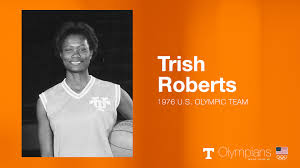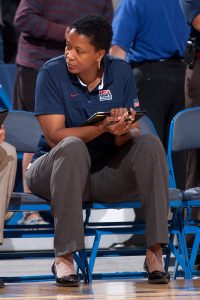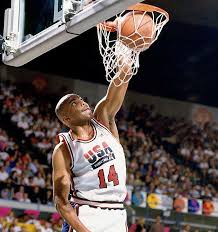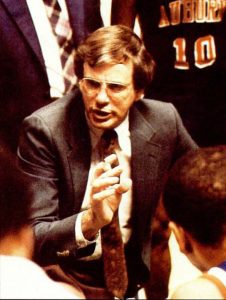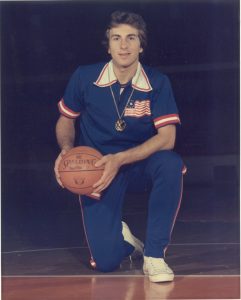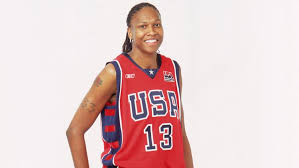The NBA Finals date back to 1947 (when they were known as the Basketball Association of America Finals) and the very 1st NCAA tourney was held in 1939. Olympic basketball competition is even older: it debuted as a demonstration event in 1904 and the men’s version became a medal sport in 1936, with the women finally getting their chance to go for the gold in 1976. The United States has dominated Olympic basketball competition from the start: the men have won 15 gold medals in the 18 tournaments they have participated in during the past 84 years, while the women have won 8 gold medals in the 10 tournaments in which they have competed during the past 44 years. Those of you who were looking forward to the 2020 Olympics opening ceremonies in Tokyo on July 24, 2020 will have to wait an extra 364 days, as the coronavirus caused a postponement until July 23, 2021. Due to the absence of college basketball since mid-March, HoopsHD’s Jon Teitel decided to fill the void by trying to interview as many prior Olympic players/coaches as possible so that you have something to read this summer while not watching the Summer Games. We continue our coverage by chatting with Trish Roberts about winning a silver medal in 1976 and being inducted into the Women’s Basketball Hall of Fame in 2000. Today is her birthday so let us be the 1st to wish her a happy 1!
You played 1 year at North Georgia College, 2 years at Emporia State, and 1 year at Tennessee: why did you keep switching schools, and how big a deal was it to become the Lady Vols’ 1st-ever African-American player for Pat Summitt? My coach at North Georgia left after my 1st year and went to Emporia State so some other players and I followed her there. 2 years later my coach left Emporia State while I was at the Olympics: I did not even find out until I was abroad. I met Pat Summitt when we were Olympic teammates and I did not even realize that she was the head coach at Tennessee. I mentioned to another teammate that I was looking to transfer, Pat heard about it, and I ended up in Knoxville. It was a big deal at the time and it took Pat a few more years to recruit another African-American player.
What made Pat such a great coach, and what was the most important thing that you ever learned from her? Just her love for the game: even during the Olympics she spent more time with the coaches then with the players so she could soak up as much knowledge as possible. When we got to Tennessee she explained that our relationship was changing from being teammates to being player/coach. She pushed me harder than anyone else and got the most out of me.
In your very 1st game at Stokely Athletic Center in November of 1976 you set school records with 51 PTS/20 REB in a game against Kentucky: was it just 1 of those scenarios where every shot you put up seemed to go in because you were “in the zone”? Yes! I was excited about playing there so I just wanted to go out and show everyone why I made the Olympic team. The score was something like 107-53 so the headline the next day was that I almost outscored the entire Wildcat team by myself! It seemed like everything I threw up went in: it was a fairly easy game. We played a lot of our games at Alumni Gym but not that 1.
You played for team USA at the 1976 Olympics: what did it mean to you to represent your country, and what did it mean to you to win a silver medal? It meant a lot to me. My coach at Emporia State took me to the tryout for the 1975 Pan Am Games in Albuquerque. I made it all the way to the last cut and Coach Alberta Cox saw how upset I was. She told me that I was a really good ballplayer but that I needed to put on some more weight and gain some more experience. She said I could become good enough to make the Olympic team the following year and that stuck with me so every day the following season I spent a lot of time in the gym. I would run down there between classes to take some shots and would play pick-up games with the guys each weekend. Nobody thought that I would make the team but when tryouts came around in 1976 I was ready. After getting cut in 1975 I played in a summer league in California with several other women who made the league…and I was voted MVP! A local paper did a story on me dominating the league: UCLA coach Billie Moore read the article and then came over to watch several of my games because she was going to be the Olympic coach in 1976.
In 1977 you averaged 29.9 PPG/14.2 RPG/65 FG% while becoming the 1st Kodak All-American in Tennessee history: how were you able to balance your scoring with your rebounding? I do not know: I was the tallest player on the team so it was just natural. We had a very good PG in Holly Warlick who came to Tennessee on a track scholarship. She was very quick and could dish the ball but could not make a layup so if I saw her shooting then I would fill the lane to get the REB/put-back because I knew that she was going to miss. I padded my stats off of Holly and probably got 6-8 PPG off of her misses: at her retirement celebration I told her that I had her to thank for that!
In the 1977 AIAW Final 4 you had a 4-PT loss to Delta State: how close did you come to beating the eventual champs? I had to guard my Olympic teammate Lusia Harris and it was just devastating to lose: I went into a bathroom stall because I did not want anyone to hear me bawling. I have never been more upset to lose a ballgame: we were 4 PTS away from winning the 1st title in school history. Delta State won the title game over LSU by 13 PTS and we won the consolation game over Immaculata by 20 PTS.
That summer you won a silver medal with team USA at the World University Games along with future Hall of Famers Carol Blazejowski/Ann Meyers: how good was that Soviet team that beat you twice by 17+ PTS? It was a different team/coach/philosophy than we had during the Olympics the previous summer. It was very disappointing for me. As long as the Soviets had 7’2” Uljana Semjonova they were going to dominate: nobody could guard her. It was not just her: they had a very tall team.
In 2000 you were inducted into the Women’s Basketball Hall of Fame and in 2017 you were named an SEC’s Women’s Legend: where do those rank among the highlights of your career? The Hall of Fame induction was phenomenal: after that I was inducted into a couple of other Halls of Fame. In 2016 I went into the Georgia Hall of Fame in my home state along with a class including Chipper Jones/Hines Ward: I could not believe it.
As head coach at Agnes Scott College in 2015 you beat #1-seed Finlandia in the conference tourney: how on earth were you able to overcome a 15-PT deficit in the final 4 minutes? I should have stopped coaching after leaving Maine and winning a conference title/making the Women’s NIT in 1989. I went to Michigan in 1992, which was probably the worst move of my coaching career. Pat called me after I got the job and due to our relationship she told me that she would not recruit any players from the state of Michigan while I was there. After 4 years of recruiting the best in-state players we had everything in place to have a great team but they gave me the boot in 1996. My replacement did really well and I was very happy for the players. I took some time off and then the Senior Women’s Administrator at Stony Brook called me up in 1999: I told her that I was not interested but I agreed to come to New York to meet with her in person anyway. She asked me what it would take to get me to become their coach so I sent her an email with some ridiculous requests like new locker rooms and a 6-figure salary…at a D-2 school! She called me the next day and they met my demands so I spent 5 years there. They brought in a new athletic director after my 4th year and we just clashed. After resigning I went back to school to finish my masters’ degree at Central Michigan. I lived down the road from Agnes Scott in Decatur, GA: when they contacted me I only planned to stay 1 year but ended up staying 5 years. Of all my years in coaching that was the hardest job: I had to do everything myself until finally getting a grad assistant. I called timeout toward the end of the Finlandia game and told the team that it was all on them. I put my 3 quickest guards in the game, told them to go after the ball, and we just pressed them the rest of the game. The stands were full and the crowd was electric. I am now retired and have been enjoying life.
When people look back on your career, how do you want to be remembered the most? I spent a lot of time at Tennessee last year supporting Holly: she even had me speak to the team. I want to be remembered as someone who started it all at Tennessee: nobody had ever heard of the program until I transferred in. We went 28-5 in my 1 year there and made the Final 4. Had I not done so much then I just would have been a fly-by-night player but as an Olympian/All-American I still hold a few records there. I am on the board of Directors for LOB, Inc. (which celebrates the historical relevance and ongoing contributions of the Women’s Basketball League): someone asked me if my jersey had been retired by Tennessee and I said no. I was a person who came to Tennessee and jump-started that legacy. People in Knoxville do not always recognize me when I am in town but it would be nice to eventually receive some love.

